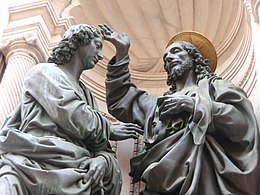Need to check for the publication....

bible.cc/revelation/22-16.htm "I, Jesus, have sent my angel to give you this message for the churches. I am both the source of David and the heir to his throne. I am the bright morning star." ...
A WORD IN SEASON
Readings for the Liturgy of the Hours
Years I and II
New Edition AUGUSTINIAN
PRESS 2001
 |
| Fr. Damasus Winzen 1901-1971 |
Second Week of Easter Wednesday
First Reading Revelation 2:18-29
Second Reading
From the writings of Damasus Winzen, O.5.B.
(Symbols of Christ, 44-45)
The stars
The
fact that the course of the celestial bodies influences life on earth led
people of old to the belief that the heavenly world of the stars is the
archetype and model of the earthly world, and that the stars in their unchangeable course - "eternal gods," as the Greeks used to call them - determine
the fate of humanity.
In the Old Testament the stars are not gods.
They are the obedient servants of the Lord of hosts who created them. They were called and they said: "Here we are"; and with cheerfulness they shone forth to him that
made them. When God laid the cornerstone of the earth, the morning stars sang together, and all the children of God shouted with joy. The stars are symbols of the just who obey God's commands
and, therefore, declare his
glory.
The king of Babylon is the rebellious star who wants to rule without serving his God. He is overthrown by the Creator of heaven and earth, as Isaiah
says of him: How are you fallen from heaven, Lucifer, son of the morning? How are you fallen to the earth that did
wound the nations? Only one star will rise to world
domination: the Star of Jacob, the Messiah. He is the
morning star because he was begotten
before the day of creation.
When he
appears here on earth, he rises in the dark of night like the morning star: at his birth in the stable of Bethlehem, at his resurrection from the dead, at his second coming. Each one of these three risings is announced by a star. The royal star leads the magi to the crib of the newborn king of the Jews. The morning star which rises victoriously out of the Easter night and greets the saviour at the dawn of the
resurrection is praised by
the deacon in the Exsultet of the paschal vigil: "May the morning star find the flame of this candle alive; that Lucifer who knows no setting, that star who, returning from hell, shone serenely upon humankind." When
the end of darkness has come and the last day dawns, the true Lucifer reveals himself saying:
I am the bright morning star. In perfect obedience to his heavenly Father, the star of Christ has run its course. His death on the cross was his setting as the evening star. His resurrection was his rising as the morning
star. All those who die with him in
baptism and open
themselves to his light have become
sons and daughters of the morning star, sons and daughters of God. When the last day dawns, the day star will arise in
their hearts, and they will hear from the lips of the risen savior the blessed
words: I will give you the morning star.













